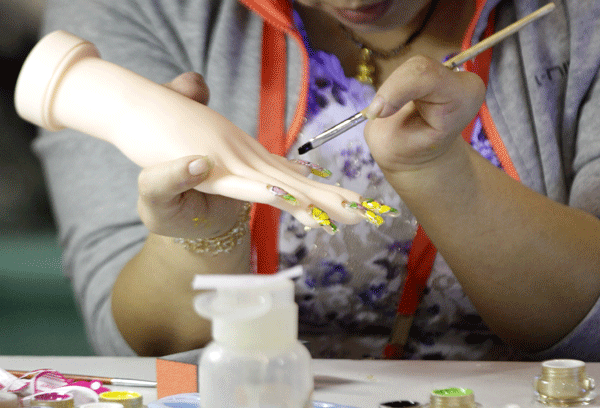The new sexual revolution
China Daily by Yang Wanli, December 3, 2014 Adjust font size:
Promoting education
 |
|
A physically disabled person uses a brush to manicure a model hand during a competition for people with disabilities in Nanjing, Jiangsu province on Sept 14. |
Because China has no official programs to promote sex education for the disabled, most of the work is done by a small number of NGOs. In August 2013, the country's first workshop on disabilities, gender, and sexuality was held at the privately organized 5th Asian Conference on Sexuality Education in Chengdu, the capital of Sichuan province.
"Everyone needs ongoing and age-appropriate sex education to help them develop positive attitudes about their sexuality, and that includes people with disabilities," said Alessandra Aresu, director of Handicap International China, an NGO that supports disabled and vulnerable people.
She said providing sex education for intellectually impaired people younger than 18 can help them to stay safe, prevent them from contracting sexually transmitted diseases, and stop unplanned pregnancies.
More importantly, according to Aresu, the NGOs are also educating the public and disabled people about the rights of the disabled to express their sexual needs in appropriate ways, and support their right to marriage and reproduction.
Du Jingchen, program assistant at the Enable Disability Studies Institute in Beijing, which focuses on social work and legal support for people with disabilities, said: "Before we let them know 'how', we should help them and the public to realize that people with disabilities are equal to everyone else, and they have the right to make their own choices under professional guidance."
In some cases, protecting disabled children from sexual harm can be problematic for parents. Last year, a couple visited the institute because their daughter, who is severely mentally impaired, was being sexually abused at school.
The couple suggested to other parents that their children should undergo a medical exam to determine if they had also been subjected to sexual abuse. "Only three of the girls were examined, and one was found to have had her hymen ruptured within the past seven days," Du said. "However, none of the parents chose to call the police because the city has so few special education schools with good facilities, and they were worried about where they would send their daughters if the school was prosecuted."
Since July, the institute has trained 20 teachers in the protection of disabled people's sexual rights. The project - which draws on experiences of disabled people in Taiwan, the US, and a number of European countries - will take nearly two years, and eventually 10 of the 20 teachers will become trainers and pass on their knowledge to future students.
"It's a start for disabled children and their parents - of coure, 20 is small number, but those few teachers will bring a very, very big future with them," Du said.
Zhao Xu contributed to the story


